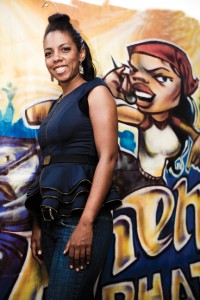Honey Jam celebrates a milestone
Canada’s longest running all-female showcase celebrates a milestone.
By Chris Penrose
Honey Jam, Canada’s longest running all-female showcase, will celebrate 15 years of trailblazing when it takes place on Aug. 15. And while the milestone is commendable, longevity was not the plan at the outset.
“I never had a long-term vision for Honey Jam,” explains PhemPhat Entertainment Group founder and CEO Ebonnie Rowe. “It was a show that was supposed to happen one time, then never again. I wasn’t a promoter, I was a legal secretary.”
Looking back, Rowe recounts the key moments that turned a wrap-up party for an all-female issue of the out-of-print Mic Check magazine into an institution in the Canadian music industry. “The first pivotal thing to happen was Jonathan Ramos (one of Toronto’s most established promoters) inviting us to be a part of Hip-Hop Sundays,” she recalls.
The all-woman lineup was something that Toronto audiences had not seen. It was also something of which local female artists had been deprived. And ultimately, it was something that was loved. “At the end of the night,” Rowe says, “everyone was coming up to me like, ‘When’s the next one?’ Everyone.”
Rowe and the ladies of PhemPhat (including DJ MelBoogie and Vivian Barclay) started to make their imprint on Toronto’s industry with related events Brown Girls in the Ring and Women on Wax. They also put together an educational initiative – an artist workshop at the Harris Institute for the Arts. Back then, the scope was very much underground.
“Especially in the early days of Honey Jam, when it was just for the love and the fun, the people who performed were not necessarily trying to make this into a career. They were performing because they loved music,” says Rowe.
Then came the first major industry breakthrough from the Honey Jam showcase: Nelly Furtado. While performing in the 1997 showcase, she was signed to a management deal, and from that discovery, a remarkable career followed. The profile of Honey Jam was raised through being acknowledged as a platform where artists could get discovered. The range of genres and the background of the performers also broadened.
“We had focused initially on genres that were traditionally male dominated, where women were not getting a chance to perform: emceeing, DJ’ing, breakdancing,” Rowe says. “As we have branched out to cover a wider variety, our audience has come along with us.”
A third history-making moment for Honey Jam was when Universal Music Canada came onboard as a sponsor. Its contributions led to two compilation CDs, the Honey Jam magazine, and the opportunity to take all aspects of the show and its marketing to a higher level. Before that, Rowe had also financed the showcase, often at a loss.
After nine years of doing the showcase (along with all of the other events), Rowe decided to retire and announced that Honey Jam was coming to an end. “It was wearing me down physically, emotionally and financially.” In recognition of the institution that Honey Jam had become in Toronto, Rap City on MuchMusic devoted an entire episode to saying goodbye.
Clearly, though that wasn’t the end. Rowe explains why: “I’m sitting at home watching the episode, and they are interviewing one of the artists. She looks directly into the camera and says, ‘Ebonnie, Ebonnie, if you’re watching this, please don’t stop Honey Jam.’ That pulled at my heart strings.” In this anecdote is the pattern.
Honey Jam, as a showcase, came about because people asked for it. It has stuck around because it continues to impact the lives of young women. The stories of those women have fueled Rowe through the tough times. From all accounts, those trying times that could have spelled the end of the showcase have passed.
Rowe and her team are now looking to expand on the success they have enjoyed. “I would love to do another compilation, something for television and shows in different cities,” she says. Look out for all three in the near future.







Leave your response!